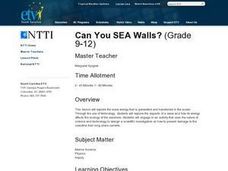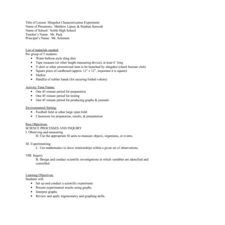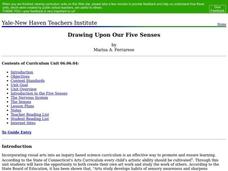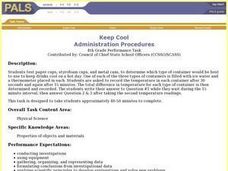American Chemical Society
Dissolving is a Property
Believe it or not, it is possible for liquids and solids to get along! A hands-on lesson has individuals explore dissolving properties of candies in water. They complete an activity guide to record observations about different candies...
American Chemical Society
Heating Can Make a Change That Cannot Go Back Again
Heat is a gateway to change. While exploring the properties of baking powder, pupils learn that some heat-related changes are permanent. Using an animation, the lesson uses chocolate chip cookies as an example.
American Chemical Society
What Makes it Rain?
Clouds come alive when curious minds create rain in an action-packed activity. Scholars view a video of rain and analyze an image of water uses to generate a class discussion leading into a hands-on exploration. Using a set of...
Curated OER
Science: Exploration Tubs
First graders develop skills of scientific inquiry. They determine which objects float and which sink.
Curated OER
Chemical Reactions With Vinegar
Second graders observe chemical reactions. In this scientific inquiry lesson plan, 2nd graders determine whether vinegar creates a chemical reaction by observing two different experiments. A list of 7 supplies is included. In addition,...
Curated OER
Can You SEA Walls?
High schoolers explore how wave energy that is generated and transferred in the ocean. They explore the aspects of a wave and how its energy affects the ecology of the seashore. Students engage in an activity that uses the nature of...
Curated OER
Slingshot Characterization Experiment
Students set up and conduct a scientific experiment to demonstrate data collection. In this scientific process lesson, students complete an activity with the specific objective of using a slingshot to fire a t-shirt into the crowd at a...
Curated OER
Insect Monitoring
Students practice the scientific method in the classroom, either in preparation or as a substitution for real-world field experience. They examine a simulated biodiversity research situation, using a "mini-plot" or
sampling square...
Curated OER
Meeting an Earthworm
Students inspect the anatomy of earthworms. In this earthworm lesson plan, students participate in a hands-on experiment as they analyze the structure of earthworms. Students demonstrate mastery through differentiated products. Lesson...
Curated OER
Acids and Bases: Together again!
Students identify principles behind acid-base reactions. They predict factors that may affect an acid-base reaction. Students identify questions and concepts that guide scientific investigations.
Curated OER
Is the Hudson River Too Salty to Drink?
Students explore reasons for varied salinity in bodies of water. In this geographical inquiry lesson plan, students use a variety of visual and written information including maps, data tables, and graphs, to form a hypothesis as to why...
Curated OER
The Big "Why"
Students examine the Q.& A. article found each week in the Science Times, focusing on how the answers present scientific data in a clear and logical manner. They write their own questions and answer other classmates' questions in the...
Curated OER
What's the Matter? (Experiments)
Students observe a scientific discrepant event, and are then challenged to create experiments to solve the dilemma.
Curated OER
Grant Proposal
High schoolers experience the creativity, anticipation and peer review of obtaining a grant for scientific research at the poles. They work in cooperative groups to assess the dynamics of polar regions. Each student proposes an original...
Curated OER
Drawing Upon Our Five Senses
Students observe and create artistic representations, technological images, and scientific diagrams. They explore the five senses, the structure and function of the corresponding organs, and how the senses are connected to the human brain.
Curated OER
Looking At Variables
Students predict and test different variables that would effect sugar cubes dissolving in water. In this dissolving lesson plan, students have 4 petri dishes with 4 different variations of sugar cubes and water. They predict which will...
Curated OER
Cell Division: Frog Egg Division Observation and Modeling
Learners create and test a hypothesis about cell division. After observation of Frog Egg cell division, students write obervations and refine process and hypothesis. The use of scientific method, group work and inquiry are fostered by...
Curated OER
Coal Flowers
Let's make coal flowers! With this fun activity, young learners watch and learn as they grow crystals! With simple household materials and the instructions included in this lesson plan, your class can grow their own crystals. Learners...
Curated OER
Mineral Lab
Eighth graders examine the physical properties of different minerals. In this earth science lesson, 8th graders explain the uses of minerals in their daily lives. They complete the mineral identification table during the lesson.
Curated OER
What Kind of Insect is That?
Fifth graders characterize insects and classify insects according to the Linnaean system. They use hand lenses or microscopes to examine insect body parts.
Curated OER
Pulse
Students determine a baseline pulse rate then chart the changes in rate with exercise. They describe the changes and develop a rationale for their observations. The task assesses students' abilities to make simple observations, determine...
Curated OER
Keep Cool
Students design an experiment to determine which type of container would be best to use to keep drinks cool on a hot day. Students test paper cups, styrofoam cups, and metal cans by filling them with ice water and they use a thermometer...
Curated OER
Walk and Learn
Fourth graders take a nature walk on a nice sunny spring day. They discuss different things in nature. They write down observations in their notebook.
Curated OER
Preparing for the New Haven Public School Science Fair Through Environmental Science
Pupils discover what type of effect that pesticides have on earthworms. They use three different types of pesticide and examine the external and internal effects that each have on earthworms. They maintain earthworms in habitats sprayed...
Other popular searches
- Scientific Inquiry Lesson
- Scientific Inquiry Skills
- Scientific Inquiry Method
- Scientific Inquiry Health
- Scientific Inquiry Model
- Scientific Inquiry Process
- Scientific Inquiry Lab
- Scientific Inquiry Music
- Scientific Inquiry Questions
- Scientific Inquiry + Health
- Scientific Inquiry Experiments
- Scientific Inquiry and Design























